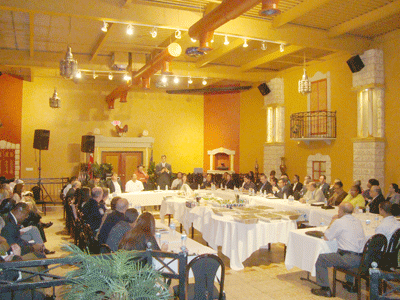
|
| The bi-monthly BRIDGES meeting was held on September 22, 2010 at the Lebanese American Heritage Club in Dearborn. |
The meeting also hosted representatives from various government agencies including Customs and Border Protection, Citizenship and Immigration Services, Immigration and Customs Enforcement, the FBI, as well as numerous representatives from local community organizations.
The majority of the concerns raised during the meeting were ongoing issues pertaining to border stops and port of entry matters. Representatives from Customs and Border Protection informed the meeting’s participants of recent efforts to improve the border crossing process, including upgrades to the computer system used at the U.S.-Canada border.
Many of the attorneys and community leaders spoke of the frustration felt by members of the Arab American and American Muslim communities whose names appear on watch lists due to a mistake or mismatch in the DHS computer system.
Schlanger stressed the use of the Traveler Redress Inquiry Program (TRIP), an initiative implemented by DHS which is designed for individuals who have inquiries or seek resolution regarding difficulties they have experienced during their travel screening at ports of entry. By filling out a form on the DHS website, travelers who are on a watch list due to a name mismatch will reportedly be removed from that list.
Lena Masri, Staff Attorney for the Council on American-Islamic Relations-Michigan, said that the TRIP program has yet to prevent individuals from being handcuffed and held for hours while crossing into and returning from Canada. “We’ve seen cases where people have gone through the TRIP program but are still handcuffed,” she stated. “And with the system that is currently in place, there is no way of challenging their designation.”
DHS officials stated that through the TRIP program, it could take anywhere from 30 days to a year to have a person removed from a watch list.
“There are many tough, ongoing problems that our community in particular has been dealing with over the past several years,” stated Imad Hamad, BRIDGES co-Chair and ADC Michigan Regional Director. “Many of these problems have been resolved, so I commend CBP and other agencies for that. But the fact remains that there are issues that are recurring over and over again on a daily basis, many times to the same individual, and this needs to be addressed.”
McQuade acknowledged that the Arab American community has been facing numerous challenges since September 11, and emphasized the need for these issues to be brought to the attention of the U.S. Attorneys Office and other agencies.
“Much like the community, I have been hearing complaints for the past nine years,” claimed McQuade. “When it happens, we want to hear about it and we want details so we can investigate properly. In essence we want the process to work and if we work together we can achieve this.”
Also discussed during the meeting was the recent surge in anti-Muslim sentiment, which has been exacerbated by the recent attention to the failed “International Burn a Qur’an Day.” FBI-Detroit Special Agent in Charge, Andy Arena, addressed concerns from community leaders regarding the increase in backlash, and discussed their efforts to respond quickly to any acts of hate against Muslims. He spoke of the recent case involving a burned Qur’an in Lansing, during which the FBI worked with the Lansing Police Department to locate and arrest the individual who committed the act.
“We’re working hard to prevent these kinds of acts from occurring,” said McQuade. “An attack on anyone’s civil rights is an attack on all of our rights.”






Leave a Reply